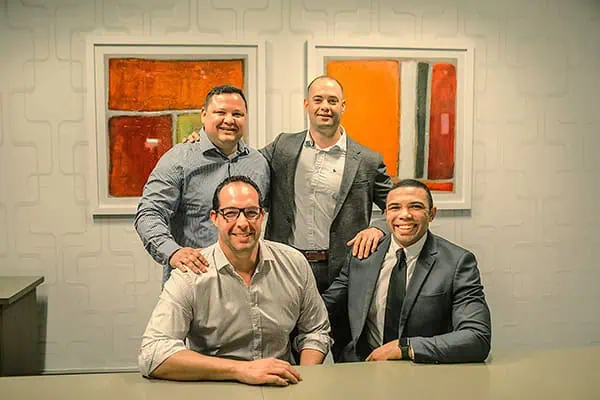By Larry Claasen
FOR many South Africans, payday is a long and often painful wait. With monthly salaries but daily expenses, workers struggle to manage finances—making Earned Wage Access in South Africa a vital solution for transport money, electricity top-ups, and groceries while trying to stretch their wages over four weeks.
Enter Paymenow, a fintech company, founded in 2019 by Deon Nobrega, former Rugby World Cup winner Bryan Habana, Willem Van Zyl and Gerbrand Potgieter, which is now rewriting the script on how employees access their earnings.
The growing demand for Earned Wage Access in South Africa
The fintech group offers Earned Wage Access (EWA), a model that allows workers to withdraw a portion of their salaries before payday. This eases short-term financial pressures without resorting to high-interest loans.
The idea behind Paymenow was conceived by Nobrega, who was a university roommate with Habana, who at the time was looking for new opportunities after his rugby career had come to an end.
Nobrega, who has a banking and tech background, had seen how EWA had taken off in the US and the UK. He told Cape Business News that they saw an opportunity for a similar product in South Africa, where unlike in the US or UK, where workers are often paid weekly or fortnightly, most South Africans receive their wages once a month – yet their expenses are daily.
“Instead of waiting for payday, you’ve theoretically already earned some money as you work. Why can’t you get access to some of that because it’s really owed to you, instead of borrowing money,” says Nobrega.
Habana points out to Cape Business News that the economic pressure on South African employees is more acute than that experienced by those in the US and the UK, and that local workers could easily fall into debt with micro-lenders.
A financial lifeline, not a loan
Paymenow isn’t a payday lender. Instead, it partners with employers to give workers early access to wages they’ve already earned—typically up to 20% of their salary. The decision to offer the service rests with employers, who set limits on how much their staff can withdraw.
Since launching, Paymenow has grown from processing R20 000 in transactions in March 2020 to nearly a quarter of a billion rands in January 2025. The company now serves over 500 000 workers, partnering with major employers like Shoprite, Pick n Pay, Boxer, and PEP.
How Earned Wage Access in South Africa is changing financial behaviour
A major concern with early wage access is the risk of overspending, but Paymenow’s data tells a different story. Despite having access to 20% of their wages, most users only withdraw around 10%, showing a surprising level of financial restraint.
It has also changed their financial behaviour for the better.
“I think 75% to 80% say they don’t have to borrow from payday lenders or informal lenders anymore,” says Nobrega.
Workers are extremely happy with the service, with 9 out of 10 reporting improvements in their quality of life according to reports compiled by 60 Decibels, an impact measurement company.
The role of employers in Expanding Earned Wage Access in South Africa
Beyond benefiting workers, Paymenow is also proving to be a win for employers. With 60% to 80% of eligible employees signing up, companies gain valuable insights into their staff’s financial health. This allows them to make data-driven decisions on workplace benefits and support systems.
A 60 Decibels report also says that Paymenow has benefited businesses when it comes to reducing absenteeism, with 4 in 10 employers saying the level of absenteeism has dropped since introducing it.
“They are always at work and on time and not really worried about stuff like transport to work or money during the month,” according to a financial and payroll administrator in one of the reports.
For many businesses, it also removes the burden of salary advances. Instead of HR deciding who gets an advance and who doesn’t, this system automates the process, making it fair and efficient, says Nobrega.
The future of Earned Wage Access in South Africa: What’s next?
As Paymenow expands, its growing user base is giving it leverage in the market. With thousands of transactions flowing through the system, the company can negotiate bulk-buying discounts on necessities, passing those savings onto workers.
This has seen it able to pass on zero-fee deals on essential purchases like groceries, electricity, and airtime. The knock-on impact of using this service is far-reaching as it means workers are no longer paying 30% interest on payday loans and also gaining in having these deals passed onto them.
“You don’t even need money in your bank accounts, as long as you’ve worked for some of the hours in the month, we’ll give you R200 worth of food or electricity or R10 data at zero fees, and it will only come off your salary at the end of the month,” Nobrega tells Cape Business News.
To reinforce responsible financial behaviour, Paymenow has built financial literacy tools into its platform. Users earn rewards—similar to Discovery’s Vitality programme—for completing financial education modules.
Looking ahead, Paymenow is doubling down on financial wellness, recently adding a savings product that allows workers to put money into a zero-fee, interest-earning money market account.
It started as a way to access wages early, but it’s becoming a full financial wellness platform, says Habana.
